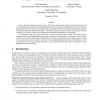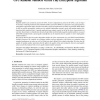389 search results - page 4 / 78 » Computational Alternatives to Random Number Generators |
SP
2006
IEEE
14 years 1 months ago
2006
IEEE
Linux is the most popular open source project. The Linux random number generator is part of the kernel of all Linux distributions and is based on generating randomness from entrop...
VOTEID
2007
Springer
14 years 1 months ago
2007
Springer
It is debatable if current direct-recording electronic voting machines can sufficiently be trusted for a use in elections. Reports about malfunctions and possible ways of manipulat...
GLVLSI
2009
IEEE
2009
IEEE
Physical unclonable function and true random number generator: a compact and scalable implementation
13 years 11 months ago
Physical Unclonable Functions (PUF) and True Random Number Generators (TRNG) are two very useful components in secure system design. PUFs can be used to extract chip-unique signat...
EGH
2010
Springer
13 years 5 months ago
2010
Springer
Random numbers are extensively used on the GPU. As more computation is ported to the GPU, it can no longer be treated as rendering hardware alone. Random number generators (RNG) a...
COCO
2003
Springer
14 years 23 days ago
2003
Springer
We study the complexity of building pseudorandom generators (PRGs) with logarithmic seed length from hard functions. We show that, starting from a function f : {0, 1}l → {0, 1} ...


